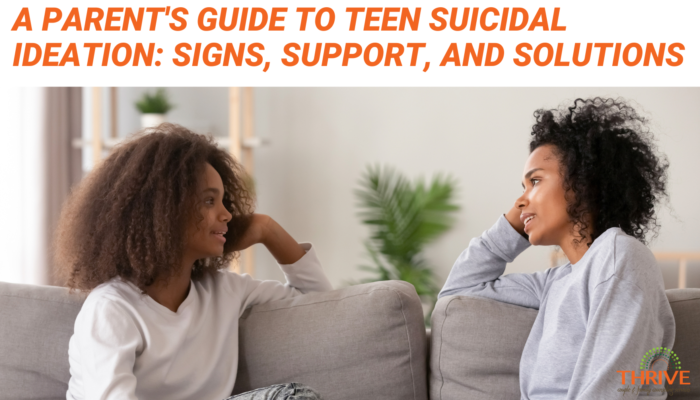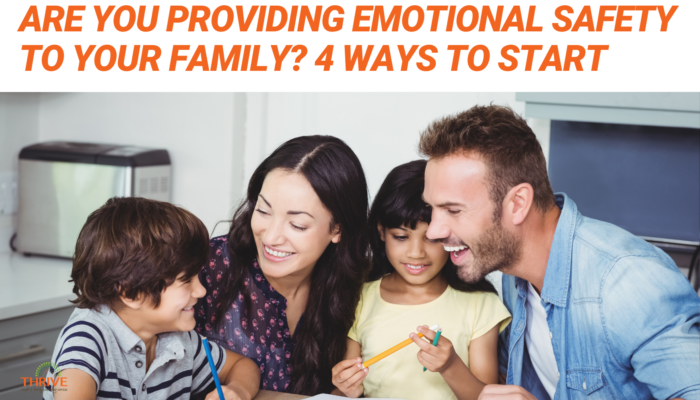As a parent or caregiver, there are few conversations more challenging or frightening than discussing suicidal ideation with a teenager. While it’s a topic no one wants to confront, it’s crucial to recognize the signs and communicate openly with your teen if you suspect they may be struggling. Whether you need Denver Tech Center Parent Counseling, Family Therapy or Teen Counseling, or just want to learn about teen suicidal ideation, we are here for you.
September is Suicide Awareness Month and as such this blog post aims to provide guidance on how to approach this delicate conversation. We’ll share the importance of emphasizing empathy, getting support for yourself and your teen, and the types of professional assistance that are available when needed.
Understand the Signs of Teen Suicidal Ideation
Before initiating a conversation about suicidal ideation, it’s essential to recognize the signs that your teen may be experiencing emotional distress. Some common warning signs include:
- An increase in stressors such as knowing someone who has died, especially by suicide; academic stress; experiencing a breakup; social struggles with peers; negative body or self-image; or a significant disappointment.
- Verbal hints or statements expressing a desire to die.
- Drastic changes in behavior, personality, or appearance.
- Withdrawal from friends, family, or social activities.
- A decline in academic performance.
- Giving away belongings or making arrangements.
If you notice these signs of suicidal ideation or suspect that your teen may be in crisis, it’s essential to take action promptly. Here are some tips for talking with your child about teen suicide:
Choose the Right Time and Place
Once you’ve recognized the signs, plan a conversation with your teenager in a safe and comfortable environment. Ensure that you have enough time to talk without interruptions. It’s best to choose a time when you’re both relaxed and not under pressure.
Approach with Empathy and Active Listening
When you begin the conversation, approach your teenager with empathy and active listening. Show that you genuinely care about their feelings and experiences. Avoid judgment or criticism, as this may deter them from opening up.
Begin with a gentle opener like, “I’ve noticed that you’ve been going through a tough time lately, and I’m really concerned about you. I want to understand what you’re going through, and I’m here to listen.”
Ask Open-Ended Questions
Encourage your teen to share their thoughts and feelings by asking open-ended questions. Avoid questions that can be answered with a simple “yes” or “no.” Instead, ask questions like, “Can you tell me more about what’s been bothering you?” or “How have you been feeling lately?”
Be Patient and Non-Judgmental
During the conversation about suicidal ideation, your teenager may share difficult or painful experiences. It’s crucial to remain patient and non-judgmental. Keep in mind that they may be feeling overwhelmed and vulnerable, and your support is essential.
Refrain from making statements like, “You shouldn’t feel that way,” or “It’s not that bad.” Instead, validate their emotions by saying, “I can see that you’re really hurting right now, and it’s okay to feel the way you do.”
Make it Easier for Them to Talk About Difficult Topics
It’s predictable that if your teen begins to open up to you, you may hear things that are difficult for you to hear.
Whether your teen is sharing that something you have done or said is hard on them, or they are telling you about something that you were unaware of and find upsetting or shocking, remind yourself that the real goal is to listen to your child and to encourage them to keep opening up to you. Try to remain calm, non-defensive and reassure yourself that you will continue to talk as a family about things that need to be discussed.
You want to attend to the safety issues currently, and can begin to tackle the other things later. Perhaps you can even get help from a family therapist to talk about any concerning behaviors you wish to address.
Offer Your Support
Let your teen know that you are there for them and willing to help. Reassure them that you love them unconditionally and that they can rely on you. Encourage them to share their feelings and thoughts with you in the future.
Assess the Immediate Risk
Assess the immediate risk to your teen by asking if they have a specific plan or access to means for self-harm. If there is a clear and immediate threat, do not leave them alone and seek professional help immediately. In the United States, you can call the National Suicide Prevention Lifeline at 988 for immediate assistance.
Encourage Professional Help
While providing your support is crucial, it’s equally important to encourage your teenager to seek professional help. A mental health professional can offer the expertise and guidance needed to address their underlying issues and provide appropriate treatment for a teenager struggling with suicidal ideation.
Follow-Up
After the initial conversation about suicidal ideation, continue to check in with your teen regularly. Let them know that you care and are available to support them as they navigate their feelings and seek professional help.
Talking to a teenager about suicidal ideation is undoubtedly one of the most challenging conversations a parent or caregiver can have.
However, approaching the conversation with empathy, active listening, and support can make a significant difference in your teen’s life. Remember that seeking professional help is essential when dealing with suicidal ideation, and don’t hesitate to reach out to mental health experts for guidance. Your teen’s well-being should always be the top priority. Schedule an appointment with one of our family counselors today for support.




